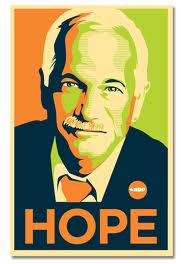I think anyone who is even vaguely aware of the real history of Western democracy is fairly hesitant to legitimize modern conservatism by actually debating with its adherents in a serious way. People like Robert Ford or the so-called "tea-partiers" are so vastly ignorant of almost anything in the realm of serious politics that to discuss with them in a serious way seems absurd and slightly perverse. In fact modern conservatives are so vastly ignorant of the roots of democracy that I am certain that history will judge so-called neo-conservatism as one of those sad and embarrassing chapters of history like the McCarthy hearings. It has recently been particularly embarrassing in the US as the 'tea-partiers' continually invoke the so-called founding fathers while knowing nothing about the real issues that surrounded the revolution and the struggles that came after it. The differences between, say John Adams and Thomas Jefferson were incredibly wide and very important. And what is perhaps even more important than the arguments between the early revolutionaries is the fact that, given the changes that gradually took place in the two centuries after the American (and French) revolution, it is absurd to attempt a simplistic application of, say, Jeffersonian or Federalist policies to todays political situation. Hamilton and the Federalists were attempting to create what they thought would be a modern democratic system by aligning with Britain, creating a central bank, and supporting commercialism and increased trade. Though their elitism and commercialism have more in common with modern Republicans than Democrats, their notion of a more centralized and powerful federal state has more to do with modern democrats. Similarly, Jefferson's fear of a powerful central government sounds sort of like modern Republicans while his fear of a commercial elite rings more of the modern Democratic party.
The fact is that you can not draw too straight a line between 18th century revolutionaries from Thomas Paine to Thomas Jefferson to Jean-Paul Marat to todays political agendas because too much changed in the meantime. Men like Jefferson and Paine feared elitism and centralized power because their only experience of the state was one of the raw power of the aristocracy. At the time it was a fitting fear. But I think they also understood that commercial power could be just as dangerous as traditional state and aristocratic power (something that modern conservatives completely miss). So you get modern conservatives invoking the name of men like Jefferson as a warning of tyranny and loss of liberty, but this is largely meaningless because if Jefferson were alive today he would understand that while the state must always be watched, it can also be an institution that can improve the conditions of everyone.
Above all, what modern conservatives miss (intentionally or simply out of ignorance) is that liberty in the modern world is not about low taxes or a smaller state or anything like that. Liberty has to do with an equality of opportunity. The way to increase liberty for everyone, is to ensure that as many people as possible have as much opportunity as they can. However, the conservative agenda will decrease opportunity and therefore decrease liberty. Privatizing education and healthcare (both things that conservative want to do), for example, will mean that education will be for the rich and people, like in the US, will live in constant fear of going bankrupt because they or someone in their family gets sick. Furthermore, putting more and more power in the hands of the corporations will continue to concentrate wealth and power in the hands of the few and reduce the liberty of the many.
Modern social democracy does not have its roots in any one thinker or movement. However, it grew out of those radicals who knew that the
ancien regime was an abuse of power, but also began to quickly realize that the power of the corporate elite was just as dangerous as the abusive aristocracy of the past. The men and women of the Trade Union movement and left of center parties in Western nations were the ones who really understood liberty because they knew that only when wealth and power were well distributed in society and only when we significantly increased the equality of opportunity would we begin to achieve real liberty.
Rightwing notions of liberty are simply illusory and lead to nowhere but to the past when the majority had nothing and a few rich people had more or less everything. And the remarkable ignorance of men like Robert Ford, the Federal Conservative Party leaders and the "tea-partiers" (ignorance they often seem to boast about) only illustrates that modern conservatism belongs in the dust-bin of history.




